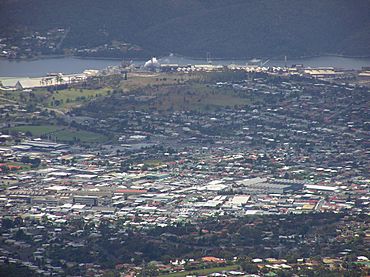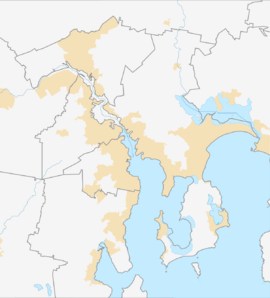Lutana, Tasmania facts for kids
Quick facts for kids LutanaHobart, Tasmania |
|||||||||||||||
|---|---|---|---|---|---|---|---|---|---|---|---|---|---|---|---|

Lutana is behind Moonah in this view from the west from Lost World.
|
|||||||||||||||
| Population | 2,616 (2021 census) | ||||||||||||||
| Postcode(s) | 7009 | ||||||||||||||
| Location | 3 km (2 mi) SE of Glenorchy | ||||||||||||||
| LGA(s) | City of Glenorchy | ||||||||||||||
| Region | Hobart | ||||||||||||||
| State electorate(s) | Clark | ||||||||||||||
| Federal Division(s) | Clark | ||||||||||||||
|
|||||||||||||||
Lutana is a suburb in Tasmania, Australia. It is part of the City of Glenorchy area, near Hobart. Lutana is about 3 kilometers south-east of the town of Glenorchy. In 2021, about 2,616 people lived there.
Lutana is a large residential area. It sits between the Brooker Highway and the River Derwent.
Contents
History of Lutana
The name "Lutana" means "moon" in one of the old Aboriginal Tasmanian languages. This name was first used in 1923 for a train station.
Lutana started as a quiet area with farms. Over time, it grew and became a place where many people live.
The first homes in Lutana were built by a company called Electrolytic Zinc. This company ran the Risdon Zinc Works nearby. These homes were for their workers. Later, the homes were sold and are now privately owned.
Trains used to serve Lutana from 1919 until 1974. Lutana had the only passenger station on this train line. The suburb was officially named a locality in 1961.
Lutana has become a popular suburb. It offers different types of homes, like wooden houses, townhouses, and apartments.
Understanding Environmental Impact
The Risdon Zinc Works in Lutana has been operating since 1917. This factory produces zinc. It also releases tiny bits of metal, called heavy metals, into the air, land, and water. These metals can affect the environment around Greater Hobart.
In the 1980s, tests of the soil in Lutana and nearby areas showed high levels of metals like zinc, lead, and cadmium. Studies found that the wind and the shape of the land affected how these metals spread.
Later soil tests in the 1990s showed that these metals were mostly in the very top layer of the soil.
A report in 2009 by the CSIRO gave advice for gardening. It suggested growing vegetables like lettuce, spinach, carrots, and beetroot in raised garden beds. These beds should have at least 30 centimeters of clean soil. This helps keep the vegetables safe from absorbing heavy metals.
Reports from 2018 showed that Hobart had some air pollution. This pollution included gases like nitric oxide, nitrogen dioxide, and sulfur dioxide. These gases came from different sources, including factories.
Geography of Lutana
The River Derwent and New Town Bay form the eastern borders of Lutana.
Roads and Transport
The main road, National Route 1 (Brooker Highway), runs along the south-west side of Lutana. Other roads also help people get around the area.
 | Valerie Thomas |
 | Frederick McKinley Jones |
 | George Edward Alcorn Jr. |
 | Thomas Mensah |



